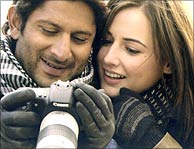The Canadian newspaper Globe and Mail, while condemning Khan's first feature film Kabul Express with just one and half stars (out of four), nevertheless wrote: 'To his slight credit, Khan does display a firmer grasp of the country's social complexities than do certain presidents and prime ministers, but that's hardly setting the bar high.'
Khan and producer Aditya Chopra's dream of making a crossover film with Kabul Express has clearly derailed.
The film, which opened last week after playing at a number of film festivals including Toronto and London, generated more stories about the adventure of making it in a Taliban devastated Afghanistan than reviews.
Going by the early reviews it got when it opened at the Toronto Film Festival in September, Khan shouldn't be worrying that his film was neglected by the mainstream media.
'Hey, isn't it about time for a light-hearted romp through post-9/11 Afghanistan?' asked the Globe and Mail. 'Khan thought so, and the bizarre result is Bing Crosby and Bob Hope on the road to Kabul. Okay, they're actually a pair of Indian journalists who enter Afghan territory in hopes of interviewing some Taliban bad guys.'
 The worst part of the review concerned the American actress in the film.
The worst part of the review concerned the American actress in the film.
'There (in Afghanistan), they (John Abraham and Arshad Warsi) stumble and bumble and argue about cricket and have the great misfortune to meet an American photographer played by someone named Linda Arsenio, whereupon their misfortune becomes ours. Let's hope, for Arsenio's sake, that impersonating an actor is not a punishable offence under international law, or we may have to send in more troops.'
The influential trade publication Variety wrote that Khan wasn't successful in melting comedy and serious drama.
'Slightly more charming is docu vet and tyro writer-director Kabir Khan's conscious allusions to such jaunty Hollywood filmmakers of yore as George Roy Hill, as he interjects regular doses of light buddy comedy and whimsical action into an otherwise serious set of circumstances. To be sure, though, (John) Abraham and (Arshad) Warsi are no Paul Newman and Robert Redford (Butch Cassidy and the Sundance Kid).
Before the reviews had come, Khan had seemed very enthusiastic about finding wider audiences for his film. After he saw a few, he would only say that he was still optimistic that the film would eventually be discovered by critics when it had a larger release.
"We think we have reached a stage in Indian film history that we can afford to make films for international audiences," he had told me in September. "I am sure audiences abroad have seen anything like this."
Last week's box-office showed that the film, which drew just a few reviews from mainstream publications, could not resonate with even art-house audiences in the mainstream. The film was not advertised in the mainstream media.
Hollywood Reporter, the respected trade publication had warned (and it seems now, to be correctly), soon after the Toronto screening: 'It offers authentic locations (making the shoot a dangerous one) and supporting cast and clearly understands the politics of the conflict. Still, the resulting film is a run-of-the-mill road story that will fare poorly with American audiences.
It did not fare well with desi audiences too.
In North America, it grossed an anaemic $142,000 in its first three days in 50 theatres. But compare its earning with that of Dhoom:2, which in its fourth week, grossed $110,000, taking its total to $2.5 million. Yash Raj Films produced and distributed both films.
In the United Kingdom, too, Kabul Express was limping. At the average rate of attrition for Hindi films in North America, the film could derail by 50 percent next week and may need a miracle to reach $500,000 in the final reckoning.





